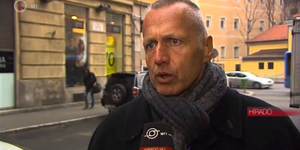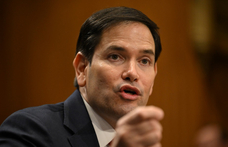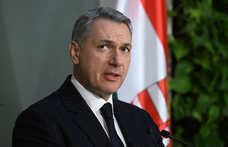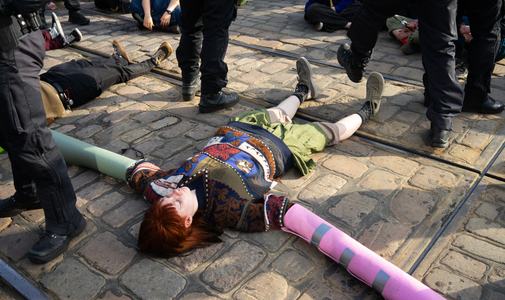If we ignore the point where Viktor Orban's party achieved its greatest degree of popularity and when the Socialists were at a historic low, we are struck by a strange metaphor. If we forget to pull the handbrake, then a car on a slope will just roll until it hits something. But to get to the top, you have to start the motor. A democracy built on party competition seems to work in the same way. The difference is that in politics, it's the other way round. It's not unheard of for an undeserved victory to fall into a party's lap. At the same time, you have to work for unpopularity. A few examples should illustrate this.
Even at the time of the Bokros package, the Socialist Party was doing better than it is now. If the trend doesn't turn, the party could be facing a collapse like that suffered by the Hungarian Democratic Forum in 1994, when Antall's successors lost half the votes they had received at the previous election. And they'll suffer this fate for the same reason that the first two freely elected parliamentary majorities did. Unavoidable reforms in economic and social policy lead to catastrophic losses of popularity. But how can it be that while at the end of the 1990s most analysts thought belt-tightening had placed the Hungarian budget on sound foundations, today, public debt and budget deficits have reached the levels we saw in the early 1990s?
Jozsef Antall's government was bound to fail from the moment it took office. It was always going to be impossible to resolve the tensions created by 40 years of dictatorship over the course of one parliament. What's more, that government ran into trouble trying to deal with the shortages that were a side effect of the Kadar era. Petrol prices rose, inefficient industrial combines and uncompetitive industries had to be shut down. The MDF's opposition merely needed to channel a mood of protest. You have to work hard for a fiasco. Victories come unbidden. Hungary's first government after Kadar was predestined to fail. The failure might not have been so disastrous if it had not alienated both the Kadarist masses and believers in Western-style modernisation. But the modernisers began to fear the government would resurrect the anti-semitic and irredentist course of the Horthy system.
Gyula Horn, the Socialist who took power after the following election, did nothing for more than half a year. He had reason to do nothing. He saw that inactivity would not harm his popularity, while he had everything to lose from acting. He won the election through a combination of welfare demagoguery and nostalgia for the Kadar era. If he had told the truth, he would have had to act on it - acknowledging that there was no free lunch, and that the state could not care for its citizens from the cradle to the grave. And that only the needy could expect to receive services for free. It's true that Lajos Bokros's package shocked society, but the coalition could have won despite this. Voters started to understand that a country founded on performance and competition had to be built on personal responsibility and not on paternalistic over-protectionism. But voters could not accept that, while they were being asked to behave responsibly, people near the nexus of power appeared to transact business according to different rules, with evidence of gangsterism appearing on the streets.
Viktor Orban's party did not lose the election because of accusations of corruption. That's not to say that his government, which came to power in 1998, looked any cleaner. But by then, the people had learned the rules of domestic politics. Voters lost their illusions, realising that quality of live in a democracy depends very little on the identity of the party in government. Antall's and Horn's governments were forced to undertake emergency measures. Their job was to inch away from the abyss. Bu Fidesz's top team took power at a time when the economic indicators looked healthier. The dirty work of stabilisation had been carried out before them. If Orban had allowed people to benefit from prosperity proportionately to their ability, he could have governed for three terms. Instead, however, he resurrected some of the habits of the Kadar era. He tried to show citizens that they could expect free college degrees and tooth fillings, and that the postman could deliver family benefits to everyone. He indulged people, even promising to disregard rising prices for gas on the global market. By so doing, he dug his political grave.
For if voters believed that what had been taken away could be restored to them with a stroke of the pen, then why shouldn't they listen to even more extreme forms of demagoguery? Why not listen to those who promised 50 per cent wage rises, a 13th monthly pension, abolition of the TV licence, a gas price freeze? People were psychologically prepared for the Medgyessy government's heedless spending spree. (None of which absolves the present coalition of responsibility). Viktor started playing with a match. Megyo set the house on fire. Fleto watched it burn for two years, before finally donning his fireman's costume, adopting a serious, responsible facial expression, and summoning on people to roll up their sleeves and get going on reform. Which is why the Socialist Party and its Liberal junior coalition partner are in freefall in the polls.
The people is more convinced of Kadar's wizardry than ever. It won't help even if people can be persuaded otherwise. The politicians that bite the bullet will just be published by the electorate.
László Tamás Papp



















